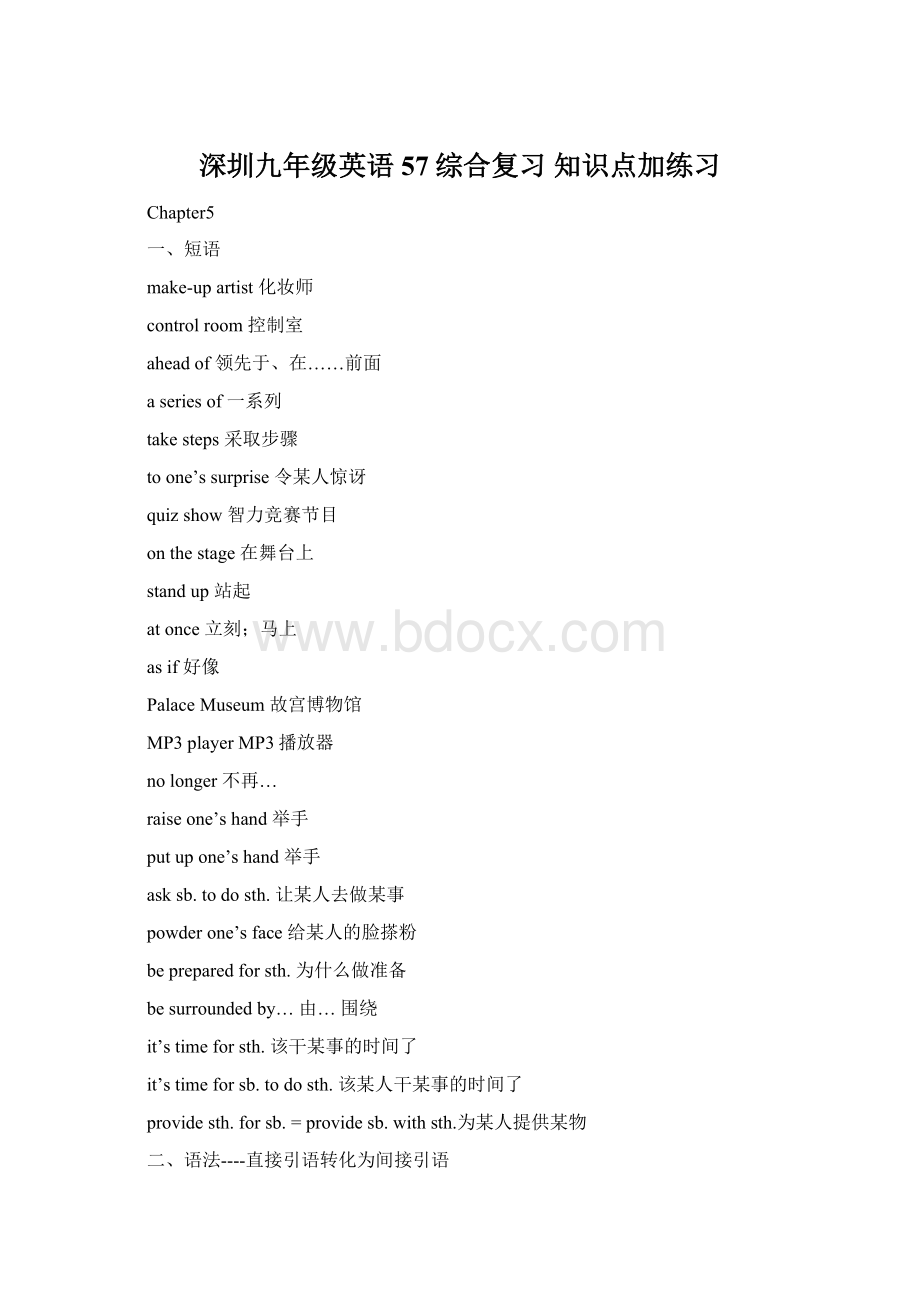深圳九年级英语57综合复习知识点加练习.docx
《深圳九年级英语57综合复习知识点加练习.docx》由会员分享,可在线阅读,更多相关《深圳九年级英语57综合复习知识点加练习.docx(18页珍藏版)》请在冰豆网上搜索。

深圳九年级英语57综合复习知识点加练习
Chapter5
一、短语
make-upartist化妆师
controlroom控制室
aheadof领先于、在……前面
aseriesof一系列
takesteps采取步骤
toone’ssurprise令某人惊讶
quizshow智力竞赛节目
onthestage在舞台上
standup站起
atonce立刻;马上
asif好像
PalaceMuseum故宫博物馆
MP3playerMP3播放器
nolonger不再…
raiseone’shand举手
putupone’shand举手
asksb.todosth.让某人去做某事
powderone’sface给某人的脸搽粉
bepreparedforsth.为什么做准备
besurroundedby…由…围绕
it’stimeforsth.该干某事的时间了
it’stimeforsb.todosth.该某人干某事的时间了
providesth.forsb.=providesb.withsth.为某人提供某物
二、语法----直接引语转化为间接引语
直接引语:
当事人直接说的话,需要用引号引起来。
间接引语:
不是当事人说的话,而是别人转述当事人说的话,不需要用引号引起来。
当直接引语转化为间接引语时,人称、时态、句式及时间、地点等都要发生相应的变化。
(一)、人称的变化
人称变化可以遵循如下顺口溜“一随主,二随宾,第三人称不更新”。
“一随主”是指在直接引语变间接引语时,如果从句中的主语是第一人称或被第一人称所修饰。
从句中的人称要按照主句中主语的人称变化,如:
Shesaid,“Mybrotherwantstogowithme.”
→Shesaidherbrotherwantedtogowithher.
“二随宾”是指直接引语变间接引语时,若从句中的主语及宾语是第二人称,或被第二人“你”所修饰,从句中的人称要跟引号外的主句的宾语一致。
如果引号外的主句没有宾语,也可以用第一人称,如:
HesaidtoKate,"Howisyoursisternow?
"
→HeaskedKatehowhersisterwasthen.
“第三人称不更新”是指直接引语变间接引语时,如果从句中的主语及宾语是第三人称或被第三人称所修饰从句中的人称一般不需要变化,如:
Mr.Smithsaid,“Jackisagoodworker.”
→Mr.SmithsaidJackwasagoodworker.
(二)、时态的变化
Directspeech
Directspeech
Simplepresent
Simplepast
Simplepast
Pastperfect
Presentperfect
Pastperfect
Simplefuture
Pastfuture
例:
1.Shesaid,“Wehopeso.”→Shesaidtheyhopedso.(一般现在时变一般过去时)
2.Hesaid,“Icaughtacoldyesterday.”
→Hesaidhehadcaughtacoldthedaybefore.(一般过去时变过去完成时)
3.Shesaid.“Ihavelostapen.”
→Shesaidshehadlostapen.(现在完成时变过去完成时)
4.Shesaid,“Hewillgotoseehisfriend。
”
→Shesaidhewouldgotoseehisfriend.(一般将来时变过去将来时)
注意:
在以下几种情况下,在直接引语变为间接引语时,时态一般不变化。
①如果直接引语中的一般现在时表示一种反复出现或习惯性的动作,变间接引语,时态不变,如:
Hesaid,“Igetupatsixeverymorning.”
→Hesaidhegetsupatsixeverymorning.
②直接引语是客观真理。
如:
“Theearthmovesaroundthesunandthemoonmovesaroundtheearth”,theteachertoldme.
→Theteachertoldmetheearthmovesaroundthesunandthemoonmovesaroundtheearth。
③直接引语是过去进行时,时态不变。
如:
Jacksaid,“John,wherewereyougoingwhenImetyouinthestreet?
”
→JackaskedJohnwherehewasgoingwhenhemethiminthestreet.
④直接引语中有具体的过去某年、某月、某日作状语,变为间接引语时,时态不变。
如:
XiaoWangsaid,“IwasbornonApril20,1980.”
→XiaoWangsaidhewasbornonApril20,1980.
⑤如果直接引语中的情态动词没有过去时的形式(例:
oughtto,hadbetter,usedto)和已经是过去时的形式时,(例:
could,should,would,might)不再变。
如:
Petersaid,“Youhadbettercomehavetoday.”
→PetersaidIhadbettergotherethatday.
(三)、句式变换
1、直接引语如果是陈述句,间接引语应改为由that引导的宾语从句,that可以省略。
如:
Shesaid,“Ourbuswillarriveinfiveminutes.”
→Shesaid(that)theirbuswouldarriveinfiveminutes.
2、直接引语如果是反意疑问句,选择疑问句或一般疑问句,间接引语应改为由whether或if引导的宾语从句。
如:
①.Hesaid,“Canyouswim,John?
”→HeaskedJohnifhecouldswim.
②.“Youhavefinishedthehomework,haven’tyou?
”mymothersaid.
→MymotheraskedmewhetherIhadfinishedthehomework.
③.“Doyougotoschoolbybusorbybike?
”Shesaid.
→HeaskedmeifIwenttoschoolbybusorbybike.
直接引语如果是特殊疑问句,间接引语应该改为由疑问代词或疑问副词引导的宾语从句(宾语从句必须用陈述句语序)。
Sheaskedme,“Whendotheyhavetheirdinner?
”
→Sheaskedmewhentheyhadtheirdinner.
3、直接引语如果是祈使句,间接引语应改为“tell(ask,order,beg等)sb.(not)todosth.”句型。
如:
①.“Don’tmakeanynoise,”shesaidtothechildren.
→Shetold(ordered)thechildrennottomakeanynoise.
②.“Bringmeacupoftea,please,”saidshe.
→Sheaskedhimtobringheracupoftea.
直接引语如果是以“Let’s”开头的祈使句,变为间接引语时,通常用“suggest+动名词(或从句)”如:
Hesaid,“Let’sgotothefilm.”
→Hesuggestedgoingtothefilm.
→Hesuggestedthattheyshouldgotoseethefilm.
(四)、其他变化(指示代词、时间、地点)
指示代词 this---that these---those
表示时间的词 now---then today---thatday
thisweek(month,etc.)---thatweek(month,etc.)
yesterday---thedaybeforelastweek(month)---theweek(month)before
threedays(ayear)ago---threedays(ayear)before
tomorrow---thenext(following)day
nextweek(month)---thenext(following)week(month)
表地点的词 here---there
动词come---go,bring---take
例:
1.Hesaid,“Isthisyourpen?
”
→Heaskedmeifthatwasmypen.
2.Hesaid,“Icaughtacoldyesterday.”
→Hesaidhehadcaughtacoldthedaybefore.
3.HesaidtoJohn,“Comeherenow!
”
→HeaskedJohntogotherethen.
练习
一.把下列直接引语变成间接引语
1.“Youhavedoneagoodjob,”saidtheteacher.
2.Hesaid,“I’llhelpyouwithitlater.”
3.“Becarefulwiththedog,”Isaid.
4.“Areyousureaboutthis?
”haasked.
5.Sheasked,“What’sthematterwithyou?
”
6.Hesaid,“Wemetin2002.Wehavebeenfriendsfortwoyears.”
7.Heasked,“Alice,wheredidyoubuyit?
”
8.“Howwonderfulthejourneyis!
”hesaid.
9.“Tom,don’tforgettotakeyourraincoat,”hesaid.
10.“Whydoyoucomesolate?
”Maryasked.
二、单选
1.Theenvironmentpollutionisreallyabigproblem,sothegovernmentmust____toprotectit.
A.takeanystepB.takesomestep
C.takeanystepsD.takesomesteps
2.____,theRedteamwonthegamefinally!
A.TomysurpriseB.Tomysurprises
C.ToIsurpriseD.tominesurprises
3.It’stime____theweatherreport.
A.toB.atC.inD.for
4.Ourgovernmentprovidemuchfoodandclothes____thepoor.
A.withB.forC.toD./
5.Ifyouknowtheanswer,please____.
A.raiseyourhandB.putyourhand
C.riseyourhandD.raiseupyourhand
6.Thesun____fromtheeasteverymorning.
A.raisesB.risesC.arisesD.risesup
7.Areyouprepared____thefinalexam?
A.toB.withD.forD.at
8.Heasked_________fortheviolin.
A.didIpayhowmuchB.Ipaidhowmuch
C.howmuchdidIpayD.howmuchIpaid
9.Canyoumakesure_______thegoldring?
A.whereAlicehasputB.wherehadAliceput
C.whereAlicehadputD.wherehasAliceput
10.Thesephotoswillshowyou__________.
A.whatdoesourvillagelooklikeB.whatourvillagelookslike
C.howourvillagelooklikeD.howourvillagelookslike
11.Youcan’timagine_______whentheyreceivedtheseniceChristmaspresents.
A.howtheywereexcitedB.howexcitedtheywere
C.howexcitedweretheyD.theywerehowexcited
12.______shesaidsuggestedthatshehadn’tdecided_________togoornot.
A.What,ifB.That,whether
C.What,whetherD.What,whichever
13.I’llaskmyparents_________.
A.whethertheywillagreetogoB.iftheyletmego
C.iftheywillletmegoD.whethertheyallowmeto
14.---DoyoumindifJimwillcometohelp?
---Ireallydon’tknow________apersonlikehimcanhelpmewith.
A.whatB.that
C.howD.if
15.Heaskedmeif_____________.
A.thetrainwilllateB.thetrainalwaysarrivedlate
C.thetrainarrivesontimeD.thetrainstopshere
16.ItissaidinthebookthatThomasEdison(1847-1931)_______theworldleadinginventorforsixtyyears.
A.wouldbeB.hasbeen
C.hadbeenD.was
17.–Sorrytohaveinterruptedyou.Pleasegoon.
---WherewasI?
---You_______youdidn’tlikeyourfather’sjob.
A.hadsaidB.said
C.weresayingD.hadbeensaying
Chapter6Foodforthought
一、短语
costofliving生活费
becauseof因为
putonweight增加体重
loseweight减肥
comedown下来;下降
failsth.做某事失败了
beinfluencedby…受…的影响
spend…onsth.在…花了多少金钱、
时间
spend…indoing做某事花了多少时间
loseappetitefor…失去胃口
changethesubject改变话题
some…others…一些…另一些…
one…another…一个…另一个
one…theother…一个…另一个
avarietyof…各种各样的
alackof…缺乏
ononehand一方面
ontheotherhand另一方面
separate…from…区分…
increasetheriskof…增加…的风险
◆toomuch太多(后接名词)
muchtoo太…(后接形容词)
◆inorderto…为了(既能用于句首,也能用于句中,来引导目的状语从句)
soasto…为了(只能用于句中引导目的状语从句)
◆bitsof少量(相当于于abitof,后即可接不可数n,也可接可数名词;abit相当于一个副词,修饰形容词)
补充:
只修饰可数名词的词或词组有:
many;agreat/greatmany;alargenumberof;afew
只修饰不可数名词的词或词组有:
much;agreatdealof;alargeamountof;alittle
既能修饰可数名词又能修饰不可数名词的词组有:
alotof=lotsof;plentyof;agreat/largequantityof
◆neither…nor…既不…也不…(连接两个名词时,谓语动词的单复数与离它最近的词保持一致,即就近原则)
谓语动词就近原则的短语有:
either…or…;or;notonly…butalso…;therebe…
谓语动词就远原则的有:
aswellas;with;alongwith;togetherwith;except;but
谓语动词只能用复数的有:
both…and…;and
三、语法
(一)、haveto与needto
1.概念:
haveto表示客观上的“不得不,必须”;needto也表示“必须,有必要”,两者都有人称、数和时态的变化。
2.人称、数、时态的变化规则
we/they/you
have(had)to
need(needed)to
he/she/it
hasto(hadto)
needsto(neededto)
we/they/you
don’t/didn’thaveto
he/she/it
doesn’t/didn’thaveto
例:
It’sraining,andIhave/needtoathome.
Mylittlebrotherwasill.Ihad/neededtostayathomeandlookedafterhimyesterday.
注意:
need除做实义动词(+to)之外,还可以做情态动词(+V原)
◆need做情态动词时,一般只用于否定句和疑问句当中,其否定形式为needn’t,如:
Weneedn’tspendtoomuchtimeonit.
NeedIhurry?
◆以need开头的一般疑问句,肯定回答用must,否定回答用needn’t,如:
——NeedIgotherenow?
——Yes,youmust.
No,youneedn’t.
◆当need做谓语动词时,其反义疑问句的构成
首相要判断need是实义动词还是情态动词,如果是实义动词,则反义疑问句要用由助动词do/does构成,如果need是情态动词,则反义疑问句由need本身构成。
例:
Weneedn’tspendtoomuchtimeonit,needwe?
WeneedtoarriveShanghaiat7:
00,don’twe?
2.know,think,believe后由that引导的宾语从句,that通常可以省略,要特别注意that后的宾语从句只能是陈述语序。
例:
Ithink(that)I’llhaveasteak,chickenandsausages.
Doyouknow(that)thereisanewbookshopnearby?
◆此外,宾语从句还能用whether、if以及特殊疑问词来引导,但不变的是从句仍然要用陈述语序。
如:
Sheaskedmewhether/ifshecouldjoinus.
CouldyoupleasetellmewhereIcangetadictionary.
◆宾语从句的时态
宾语从句的时态一般跟主句保持一致,但要特别注意,如果宾语从句叙述的是客观事实、真理、自然现象等,不管主句用什么时态,从句都用一般现在时。
如:
Sheaskedmewhether/ifshecouldjoinus.
Hesaidthatlighttravelsfasterthansound.
【练习:
】
一、单选
1.—Look!
Therearetoomany____fishintheriver.Whatasad____!
Ithinkwemustdosomethingtochangeit.
A.dead;appearanceB.died;appearance